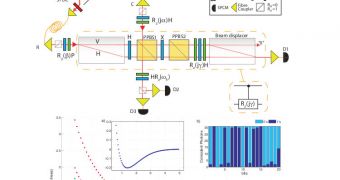While most areas of science are still waiting for the development of quantum computers suitable for their needs, chemistry is already beginning to reap the benefits of these devices. For the first time ever, scientists were able to use these impressive machines to study the behavior of atoms and molecules, a feat that could advance our understanding of the world considerably.
The thing about quantum systems of all sorts is that they are unstable by default. They rely on the uncertainty principle, which states that a quantum system can exist in more than one states at the same time, provided that the actual state is not observed from the outside. As soon as an exterior observer looks at the system, it reverts to one of its possible states. This phenomenon is especially true at the subatomic scale, where elementary particles reign supreme. In some instances however, quantum phenomena were found dominating the macroscale world.
Chemists say that they have finally found a way to use the quantum world in a manner that allows them to get rid of the messy experiments currently required to analyze the behavior of atoms and molecules. Complex setups need to be devised in order for this to happen, but now a new approach is in sight. Experts say that they can simulate the behaviors they are interested in by studying the properties of a quantum system in relation to another quantum system, whose traits can be controlled. What this means is that the atoms, ions and molecules will no longer have to be used in lab tests. The quantum systems will replace them completely.
Harvard University experts Ivan Kassal and James Whitfield believe that this approach is barely beginning to scratch the surface of what's possible to achieve in science using quantum physics. “In analogy to classical electronics, as of 2010, the implementation of quantum information processors is in the vacuum-tube era,” the experts say, referring to the fact that numerous innovations are still needed before quantum computers become an everyday necessity. Because they are able to harness the principles of quantum physics, these computers will be able to conduct more calculations per second, and will dwarf even the most powerful supercomputers of today in “brain” power, Techno0logy Review reports.

 14 DAY TRIAL //
14 DAY TRIAL //